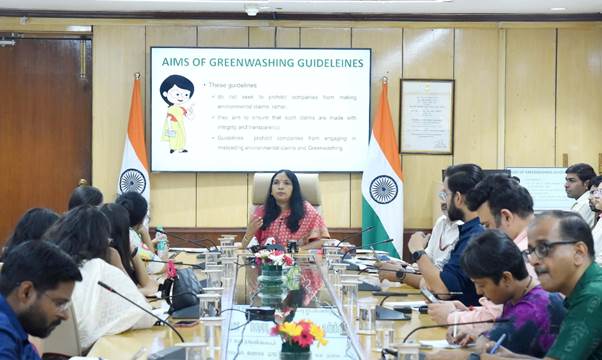CCPA Issues New Guidelines to Combat Greenwashing and Misleading Environmental Claims
In exercise of the mandate to regulate matters relating to misleading advertisements which is prejudicial to the interest of public and consumers, Central Consumer Protection Authority (CCPA) has issued guidelines for Prevention and Regulation of Greenwashing and Misleading Environmental Claims to address the issue of greenwashing and misleading environmental claims, informed Smt. Nidhi Khare, Secretary Department of Consumer Affairs, Government of India, who is also Chief Commissioner of the Authority, here today.
These Guidelines seek to foster truthful practices where environmental claims are both truthful and meaningful, thus enhancing consumer trust and encouraging sustainable business practices.
A committee chaired by Smt. Khare, Chief Commissioner CCPA was constituted on greenwashing. Amongst the members from Academia (Professor Dr.Sushila, NLU, Delhi and Prof Ashok R. Patil, Vice Chancellor, NLU Ranchi); Practitioners (Nishith Desai Associates), Activists/Organizations (Shirish Deshpande, Mumbai Grahak Panchayat and S.Saroja, Consumer Voice) and representatives from ASCI, FICCI, Assocham, and CII formed the wide spectrum of stakeholders. After adequate deliberations the committee submitted its recommendations. Based on the recommendations of the committee the Department placed the Draft Guidelines for Greenwashing for public comments on 20th February 2024. Public suggestions were received from 27 various stakeholders. The notable suggestions include:
- Specific environmental claims must be supported by disclosure about credible certification, reliable scientific evidence.
- Words such as sustainable, natural, organic, regenerative and similar assertions shall not be used without adequate, accurate and accessible qualifier.
- Adequate disclosures on claims are essential for environmental claims such as ‘natural’;’organic’;’pure’.
The Central Consumer Protection Authority (CCPA) after considerations of the suggestions unveiled the guidelines titled “Guidelines for Prevention and Regulation of Greenwashing or Misleading Environmental Claims, 2024” to prevent greenwashing and misleading environmental claims, ensuring transparency and accuracy in advertisements related to environmental sustainability.

The guidelines are drafted in the wake of the rapid increase of advertisement of green (environmental friendly) products and the growing number of environmentally aware consumers. “Greenwashing” is a term that plays on the word ‘whitewashing’ and refers to the marketing tactic where companies falsely claim or exaggerate the environmental benefits of their products or services, often using vague or unsubstantiated terms such as “natural,” “eco-friendly,” or “green.” Therefore, by creating an illusion of environmental responsibility, many unscrupulous companies end up exploiting consumers’ growing environmental sensitivity. This deceptive practice not only misleads well-intentioned consumers but also diverts attention from broader environmental efforts. These guidelines are progressive regulations intended to harmonise the proactive efforts of manufacturers and service providers to address environmental issues and rising consumer interest in environmentally positive goods and services.
These guidelines are designed not to stifle companies’ environmental efforts of manufactures and service providers but to ensure that such claims are transparentand made with integrity. Companies are encouraged to highlight their environmental initiatives, provided these claims are backed with proper disclosures and credible evidence. The primary goal of these guidelines is to shield consumers from misleading information while promoting genuine environmental responsibility within the business community. By mandating that companies substantiate their environmental assertions, the guidelines seek to foster a marketplace where environmental claims are both truthful and meaningful, thus enhancing consumer trust and encouraging sustainable business practices.
Few key Highlights of the guidelines:
- Definition of Environmental claims [section 2(e)]
- Definition of greenwashing [section 2(f)]
- Application of the guidelines [section 3]
- Clear guidelines on Prohibition against engaging in greenwashing or misleading environmental [section 4]
- Substantiation and adequate disclosure clauses [Section 5]
Key Features of the Guidelines:
- Clear Definitions: The guidelines provide clear definitions of terms related to greenwashing and environmental claims, ensuring that both businesses and consumers have a common understanding.
- Transparency Requirements: Manufacturers and service providers are required to substantiate their environmental claims with credible evidence. This includes providing detailed information on the methodology and data used to support such claims.
- Prohibition of Misleading Terms: The use of vague or misleading terms such as “eco-friendly,” “green,” and “sustainable” without proper substantiation is sought to be prohibited.
- Third-Party Certifications: Third-Party Certificationsare also accepted in substantiation of environmental claims.
- Adequate Disclosures: The companies are required to provideclear and accessible disclosures of material information. Claims must specify the aspect refer to (good, manufacturing process, packaging, etc.) and be supported by credible certification or reliable scientific evidence.
Central Consumer Protection Authority (CCPA) seeks to work closely with industry stakeholders, consumer organizations, and regulatory bodies to ensure effective implementation and compliance with the guidelines in the interest of consumers and public.
(The guidelines are available on the Department of Consumer Affairs website Greenwashing_Guidelines.pdf (consumeraffairs.nic.in)

